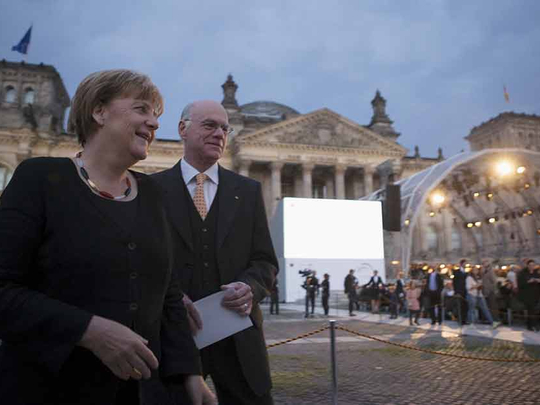
Are there reasons for Germany to be the best among European countries in the humanitarian and civilised way it treats refugees?
There is consensus among the general public that Germany now appears more humane and civilised, and that it continues to follow this emotional approach with refugees day after day, particularly those who are seeking asylum. Since the beginning, Germany seemed ready to receive all refugees and retain around 800,000 of them.
Germany has also urged its European counterparts to deal with refugees in the same civilised manner that is in line with European values.
Upon receiving the refugees, Germany quickly carried out precautionary measures followed by medical, educational and cultural procedures. Once a refugee file is ready, they undergo a medical test to ensure that they are fit. Following two days of rest, they are then enrolled in an institute to learn the German language, while students are transferred to schools and universities and the elderly to special homes so they can receive the necessary care.
This process was not being followed in other European countries, with the exception of Austria, according to the relatives of some refugees who are residing in the Gulf and some reports published on the internet.
In light of the refugee crisis, Angela Merkel, Chancellor of Germany, said her country would change for the better in the future, indicating that refugees will play a major role in this forthcoming change.
This makes it seem like Merkel possesses a vision for the future. The fact is that Europe is suffering from an ageing population, meaning that the numbers of young people are not as high as those in Arab and Asian countries.
European veto
Germany's civilised behaviour towards refugees is seen as an outcome of the country having many traditions and values. However, others cite a different reason for Germany's behaviour towards refugees and refugees; that the country is striving to become an empire, and that any nation that wants to become one must present itself in a positive manner that differs from those of surrounding countries.
Germany and the entirety of Europe are well aware that Europe cannot rise as a political or economic entity without Germany, and to a certain degree, France. Germany possesses what can be called the European veto, making it an effective nation that has no competitors.
For example, this was clear for the world to see during the Greek crisis. Greece was cornered by debts to the point of bankruptcy following the global financial crisis of 2008. Germany was quick to act, rescuing Greece by pressuring its European Union (EU) counterparts to approve a number of financial aid packages. When Greece warned that it would leave the Eurozone, none of the EU nations reacted angrily, except for Germany, which insisted that Greece and other nations must remain in the EU and the European market, basically because these nations are huge markets for Germany, particularly for its high quality industrial products.
Since the euro crisis Germany has been viewed in a positive light by its own citizens and many people in Europe, among them the Greek.
Chokehold on Greece
Manolis Glezos is a Greek hero who in 1941 climbed the Acropolis of Athens and tore down the Nazi flag. Glezos, who is 93 years of age, serves as a member of the European Parliament. He sparked widespread debate following an interview with the German Der Spiegel magazine, during which he said that Germany is striving for predominance in Europe. He pointed out that it isnt soldiers who have a chokehold on Greece, but business leaders and politicians, adding that German capital dominates Europe and profits from the misery in Greece.
The German magazine tried to soften the blow of Glezos words, and it stated that he emphasised that he did not mean the German people but rather the countrys ruling classes.Its relationship with Greece is comparable to that between a tyrant and his slaves,said Glezos.
However, the German imperial vision was not conceived by Angela Merkel in the 21st century, but rather Otto von Bismarck, a national hero who succeeded in unifying Germany in 1870-1871.
There remains one concerning issue regarding the continued migration to Europe. In just a few months, the issue might develop further and have a negative impact on the Schengen Agreement. Refugees have revealed to many people outside of the EU that the union is frail, and the agreements signed between its members were forged out of weakness and can be frozen or annulled at any time.
Mohammad Hassan Al Harbi is a writer and journalist.








